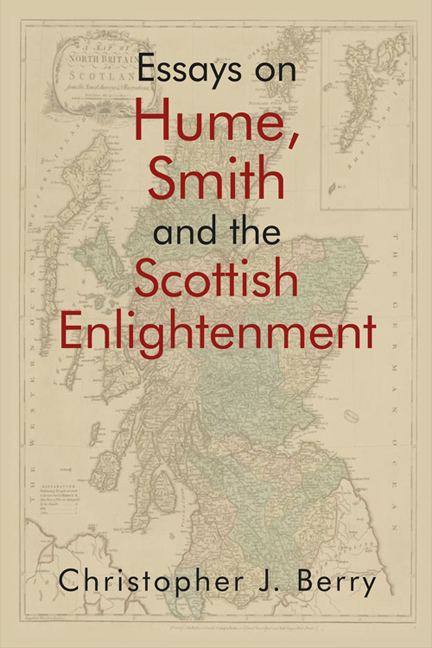1 - The Study of the Scottish Enlightenment: An Autobiographical Journey
Published online by Cambridge University Press: 06 May 2021
Summary
I have told the story of how I came to work on the Scottish Enlightenment so many times that it has been honed in the retelling to the extent that the story is my recollection of events rather than perhaps the events as they actually happened. Maybe this shows, indeed, as Benedetto Croce (1955: 17) paradoxically argued, that all history is contemporary history.
The story goes as follows. Contrary to expectation, I am not Scottish. I was born and educated in south Lancashire in northern England. A ‘grammar school boy’ at an establishment with limited ambition for its pupils, in 1964 I matriculated at the University of Nottingham, on the non-academic grounds that they guaranteed two years on campus in a hall of residence. There I studied Politics, Philosophy and Sociology – dropping the last two in my third (final) year. In Philosophy, Jonathan Harrison taught me the moral philosophy of Plato, Hume, Kant and Mill. Harrison was something of an eccentric, who would sometimes switch off in mid-sentence as some ‘thought’ occurred to him. After I had graduated, he did write two books on Hume and his study of Hume on justice remains the most extensive examination of the subject. I was reasonably successful in Philosophy, but far less so in Sociology owing to my indolence. I was, however, lectured on the Classics by Julius Gould – a fact that was to stand me in good stead.
My experience as a student of Politics (my major) was a mixed affair. I chose the subject because, from my late schoolboy days, ‘ideas’ were what fascinated. However, two years of the ‘history of political thought’ almost killed that fascination. The class lacked any excitement and, according to the lecturer (who must have been close to retirement), the final word in the study of politics was to found in Bernard Bosanquet's The Philosophical Theory of the State [1889] (1958). Fortunately, in my final year a young lecturer, J. S. (‘Mac’) McClelland, rekindled my enthusiasm for the subject. Mac was a charismatic figure who taught a specialist and exciting paper on ‘Irrationalism in Modern Political Thought’ – covering thinkers like Sorel, Nietzsche and Freud.
- Type
- Chapter
- Information
- Essays on Hume, Smith and the Scottish Enlightenment , pp. 1 - 28Publisher: Edinburgh University PressPrint publication year: 2018



